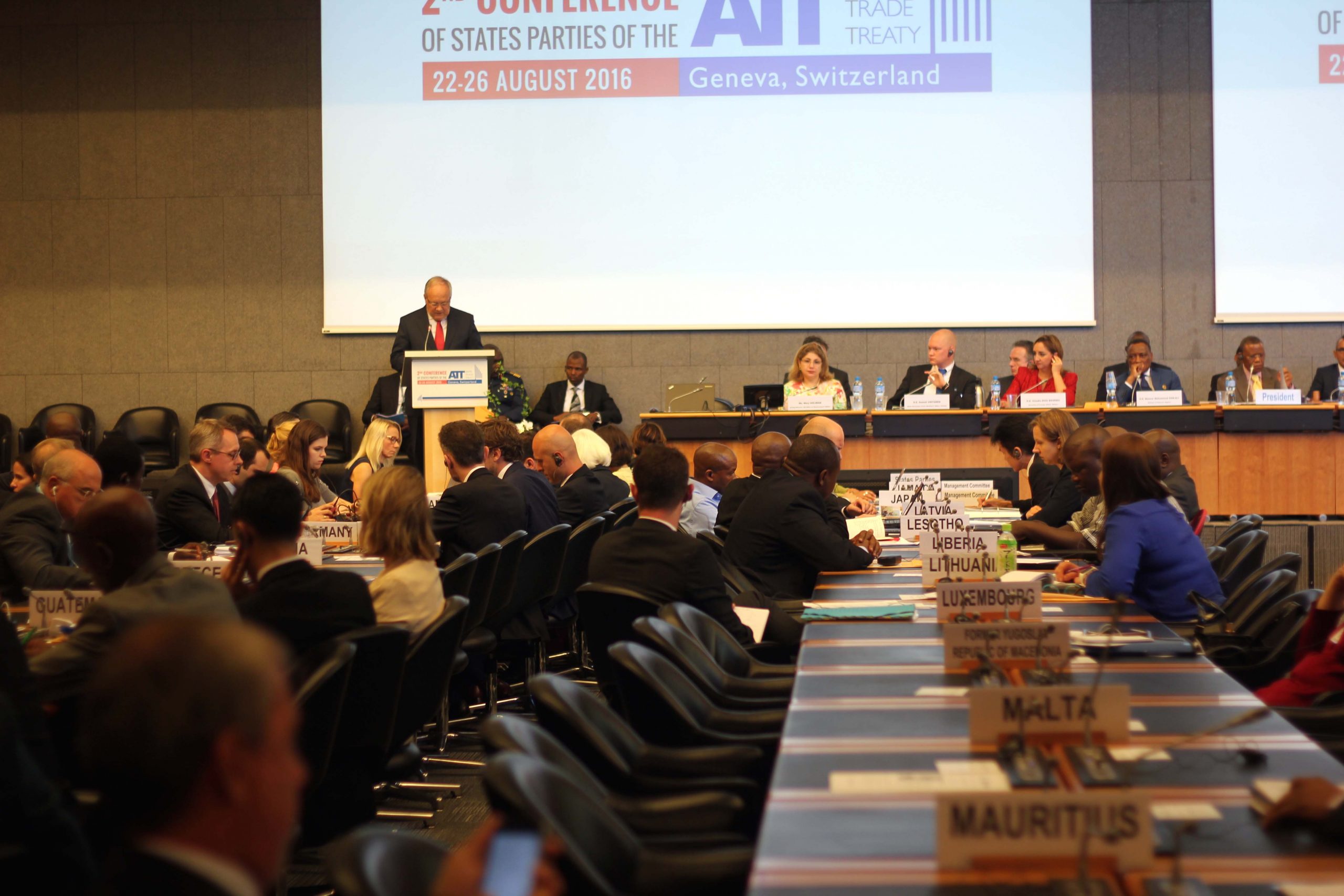The second annual Arms Trade Treaty (ATT) conference was held in Geneva in August 2016. CAAT’s Parliamentary Coordinator Ann Feltham was there, and reports on how this new treaty’s progress compares to the hype.
It was a surreal couple of days. The conference took place in the World Trade Organisation building. Very hot and sunny outside, the air conditioning rendered it icy within.
Campaign Against Arms Trade has always been sceptical about the ATT as governments, and not just those in the UK, are keener on arms promotion than on controls. While the ATT was being negotiated, its supporters argued that it would stop, for example, Russia arming Assad’s Syria. CAAT could not see this happening, any more than we could see a UK government ending its support for BAE Systems’ sales efforts in Saudi Arabia.
While Russia has not joined the ATT the UK has. However, far from being stricter in its interpretation of its export licensing regime, the situation has got worse. Even CAAT has been shocked by the UK government’s decision to continue licensing exports to Saudi Arabia, which are likely to be used in its serious, deadly violations of International Humanitarian Law in Yemen.
I was invited to Geneva to take part in a fringe meeting on Yemen. Oxfam GB’s Deputy Chief Executive said the UK government had moved from being an “enthusiastic backer” of the ATT to “one of the most significant violators”, a speaker from Control Arms ATT Monitor spoke of the global picture while I talked about the legal case that CAAT’s been forced to bring in an attempt to stop the exports to Saudi Arabia. Questions included whether similar cases could be brought elsewhere. Answer: it depends on the national legal system. The official UK government team sat quietly at the back of the room.
In the evening, following drinks on the lakeside terrace courtesy of the New Zealand government, Andrew Feinstein’s “Shadow World” film was screened. As bombs have fallen over the decades the arms companies have enjoyed power over governments. A discussion, much about arms industry corruption, followed. Again, the official UK government team sat quietly at the side of the room.
That day it felt as though we were talking about the arms trade we have been campaigning against – the next it seemed as though we were in a fantasy land. A huge room of delegates, most from governments, some from civil society, waited to be called to speak for three minutes. “I am calling on France” says the Chair; the French delegate thanks the compiler of the proposal, talks for two minutes and then says France is in favour of option X. The Chair says “Thank you France. I am calling on Mexico.” The Mexican delegate thanks the compiler of the proposal, talks for two minutes and then says Mexico is in favour of option Y and so on.
Naively, though I knew most of the real business did not take place in plenaries, I had not realised it would be quite so banal. Worse though was the feeling that this was so far detached from the arms trade – that it did not begin to acknowledge the bloodshed and destruction that goods exported from some of the countries represented there was causing.
So do I still feel CAAT was right to be sceptical about the ATT? For the most part, unfortunately, CAAT was undoubtedly correct. People are dying and, while I was there at least, the ATT conference by a Geneva lake only seems to acknowledge it in fringe meetings and handouts from civil society organisations – governments seemed want to ignore it.
However, there was also a couple of positives. While the three-minute contribution from the UK delegation on implementation ignored Yemen, following a discussion with UK-based non-governmental organisations it did include a couple of minor changes. More substantively, Saferworld and Liberian delegates were able to present their collaborative work on implementing the ATT in that country. I was told other west African states indicated they wanted to follow that example.
Where the arms companies do not have their profits at stake then, it seems progress can be made in controlling arms and stopping death and destruction. If commercial interests are involved however, arms companies and governments work together to turn a blind eye to the consequences of the trade. If the governments of major arms exporting countries continue to demonstrate that the ATT can be ignored with impunity, even the modest gains made in Liberia could be threatened.
See our Stop Arming Saudi campaign for ways that you can help keep up the pressure on the UK government.

